ICT Ethical Issue: Analysis of Facebook's Ethical Practices
VerifiedAdded on 2022/11/29
|9
|1513
|392
Project
AI Summary
This assignment analyzes the ethical issues surrounding Facebook, focusing on the "EnforceTheOrder @FTC" campaign and the company's practices regarding data privacy and user security. The paper utilizes argument visualization to represent the issues and applies four ethical theories: utilitarianism, deontological theory, contract theory, and virtue analysis. It examines how these theories apply to Facebook's actions and failures, including the Cambridge Analytica data breach and the company's responses to privacy concerns. The analysis highlights the importance of data privacy, public interest, and the potential impact of the campaign on Facebook's practices. The conclusion supports the importance of the campaign in maintaining user security and freedom of information while acknowledging the company's ongoing efforts to revise its security policies. The paper provides a comprehensive overview of the ethical problems associated with Facebook and offers insights into the potential solutions through the application of ethical frameworks.
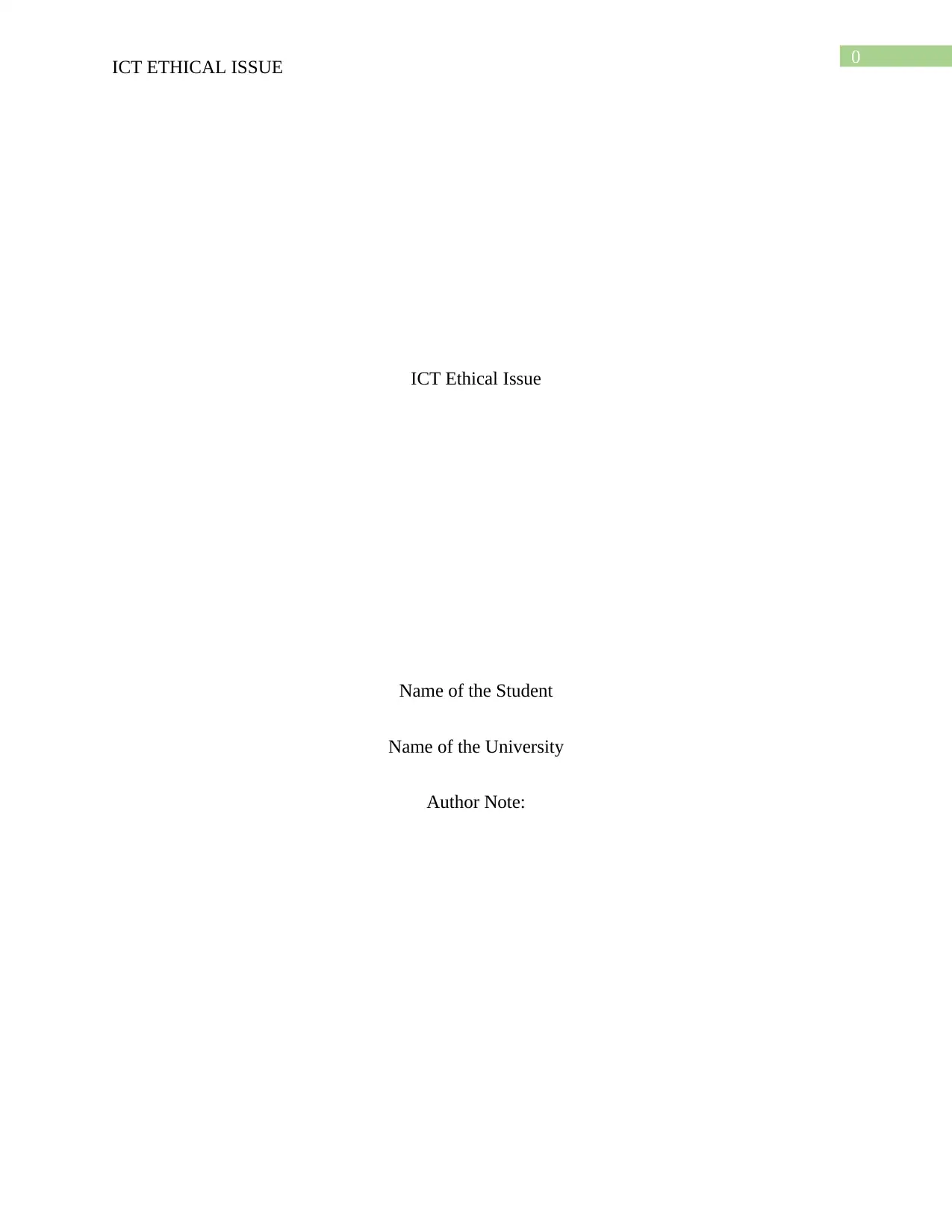
0
ICT ETHICAL ISSUE
ICT Ethical Issue
Name of the Student
Name of the University
Author Note:
ICT ETHICAL ISSUE
ICT Ethical Issue
Name of the Student
Name of the University
Author Note:
Paraphrase This Document
Need a fresh take? Get an instant paraphrase of this document with our AI Paraphraser
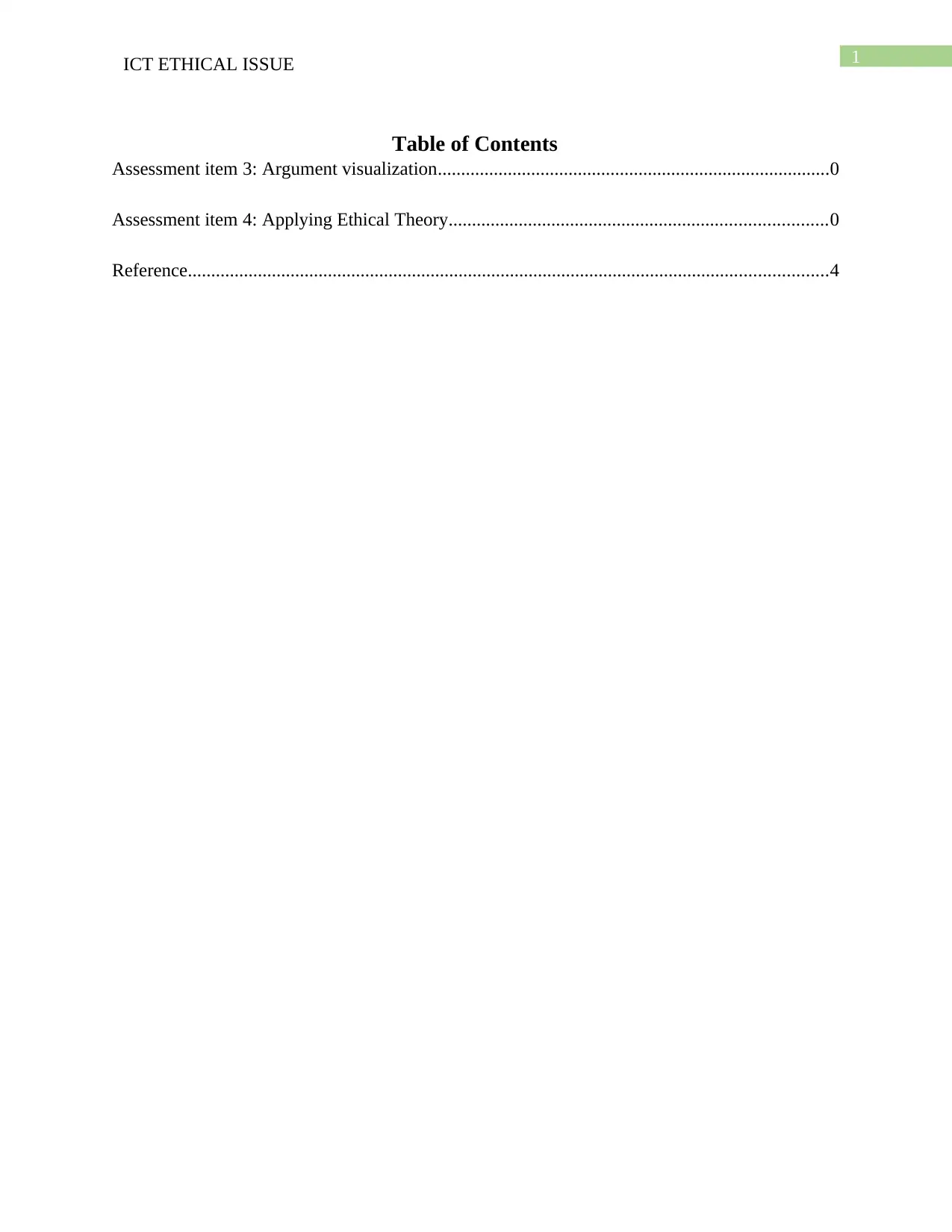
1ICT ETHICAL ISSUE
Table of Contents
Assessment item 3: Argument visualization....................................................................................0
Assessment item 4: Applying Ethical Theory.................................................................................0
Reference.........................................................................................................................................4
Table of Contents
Assessment item 3: Argument visualization....................................................................................0
Assessment item 4: Applying Ethical Theory.................................................................................0
Reference.........................................................................................................................................4
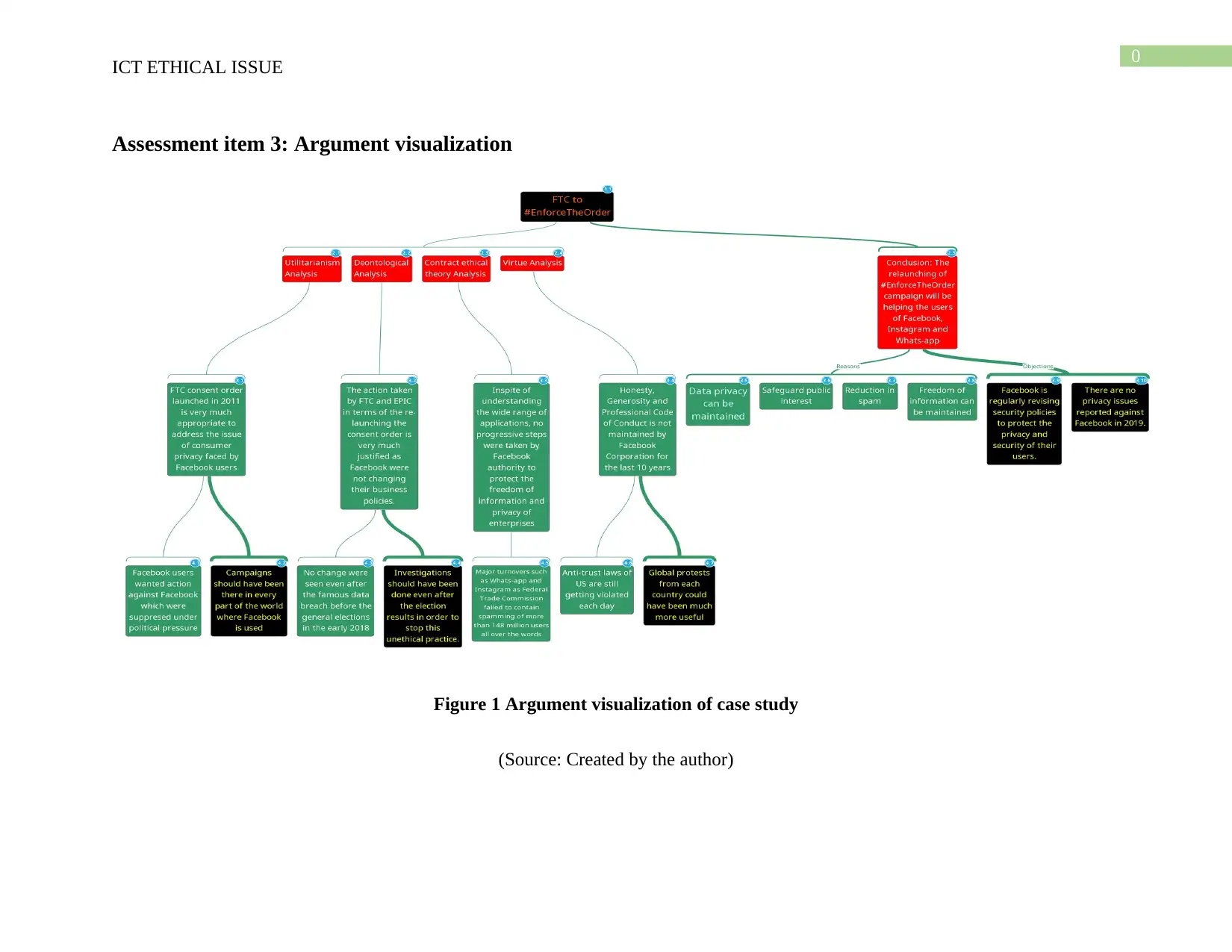
0
ICT ETHICAL ISSUE
Assessment item 3: Argument visualization
Figure 1 Argument visualization of case study
(Source: Created by the author)
ICT ETHICAL ISSUE
Assessment item 3: Argument visualization
Figure 1 Argument visualization of case study
(Source: Created by the author)
⊘ This is a preview!⊘
Do you want full access?
Subscribe today to unlock all pages.

Trusted by 1+ million students worldwide
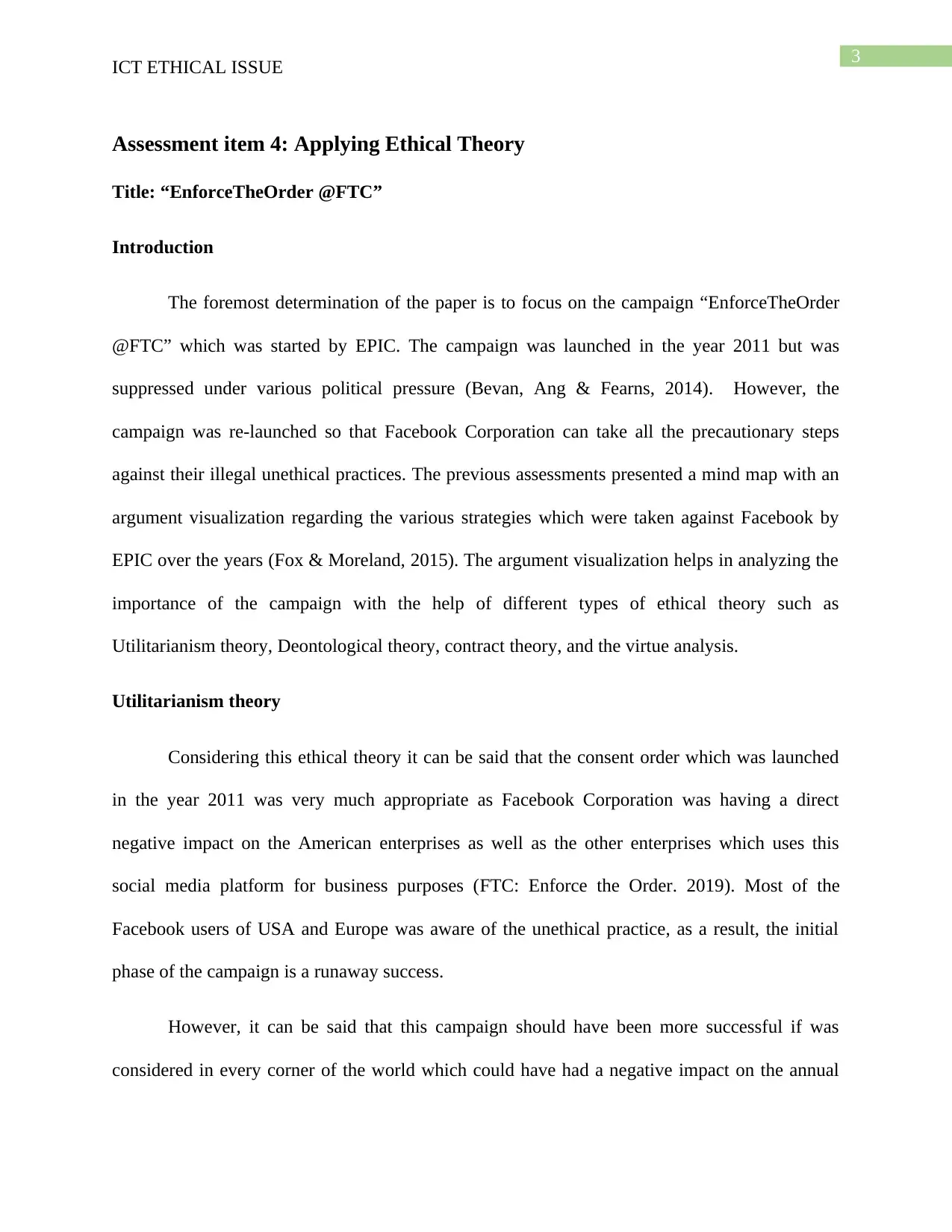
3
ICT ETHICAL ISSUE
Assessment item 4: Applying Ethical Theory
Title: “EnforceTheOrder @FTC”
Introduction
The foremost determination of the paper is to focus on the campaign “EnforceTheOrder
@FTC” which was started by EPIC. The campaign was launched in the year 2011 but was
suppressed under various political pressure (Bevan, Ang & Fearns, 2014). However, the
campaign was re-launched so that Facebook Corporation can take all the precautionary steps
against their illegal unethical practices. The previous assessments presented a mind map with an
argument visualization regarding the various strategies which were taken against Facebook by
EPIC over the years (Fox & Moreland, 2015). The argument visualization helps in analyzing the
importance of the campaign with the help of different types of ethical theory such as
Utilitarianism theory, Deontological theory, contract theory, and the virtue analysis.
Utilitarianism theory
Considering this ethical theory it can be said that the consent order which was launched
in the year 2011 was very much appropriate as Facebook Corporation was having a direct
negative impact on the American enterprises as well as the other enterprises which uses this
social media platform for business purposes (FTC: Enforce the Order. 2019). Most of the
Facebook users of USA and Europe was aware of the unethical practice, as a result, the initial
phase of the campaign is a runaway success.
However, it can be said that this campaign should have been more successful if was
considered in every corner of the world which could have had a negative impact on the annual
ICT ETHICAL ISSUE
Assessment item 4: Applying Ethical Theory
Title: “EnforceTheOrder @FTC”
Introduction
The foremost determination of the paper is to focus on the campaign “EnforceTheOrder
@FTC” which was started by EPIC. The campaign was launched in the year 2011 but was
suppressed under various political pressure (Bevan, Ang & Fearns, 2014). However, the
campaign was re-launched so that Facebook Corporation can take all the precautionary steps
against their illegal unethical practices. The previous assessments presented a mind map with an
argument visualization regarding the various strategies which were taken against Facebook by
EPIC over the years (Fox & Moreland, 2015). The argument visualization helps in analyzing the
importance of the campaign with the help of different types of ethical theory such as
Utilitarianism theory, Deontological theory, contract theory, and the virtue analysis.
Utilitarianism theory
Considering this ethical theory it can be said that the consent order which was launched
in the year 2011 was very much appropriate as Facebook Corporation was having a direct
negative impact on the American enterprises as well as the other enterprises which uses this
social media platform for business purposes (FTC: Enforce the Order. 2019). Most of the
Facebook users of USA and Europe was aware of the unethical practice, as a result, the initial
phase of the campaign is a runaway success.
However, it can be said that this campaign should have been more successful if was
considered in every corner of the world which could have had a negative impact on the annual
Paraphrase This Document
Need a fresh take? Get an instant paraphrase of this document with our AI Paraphraser
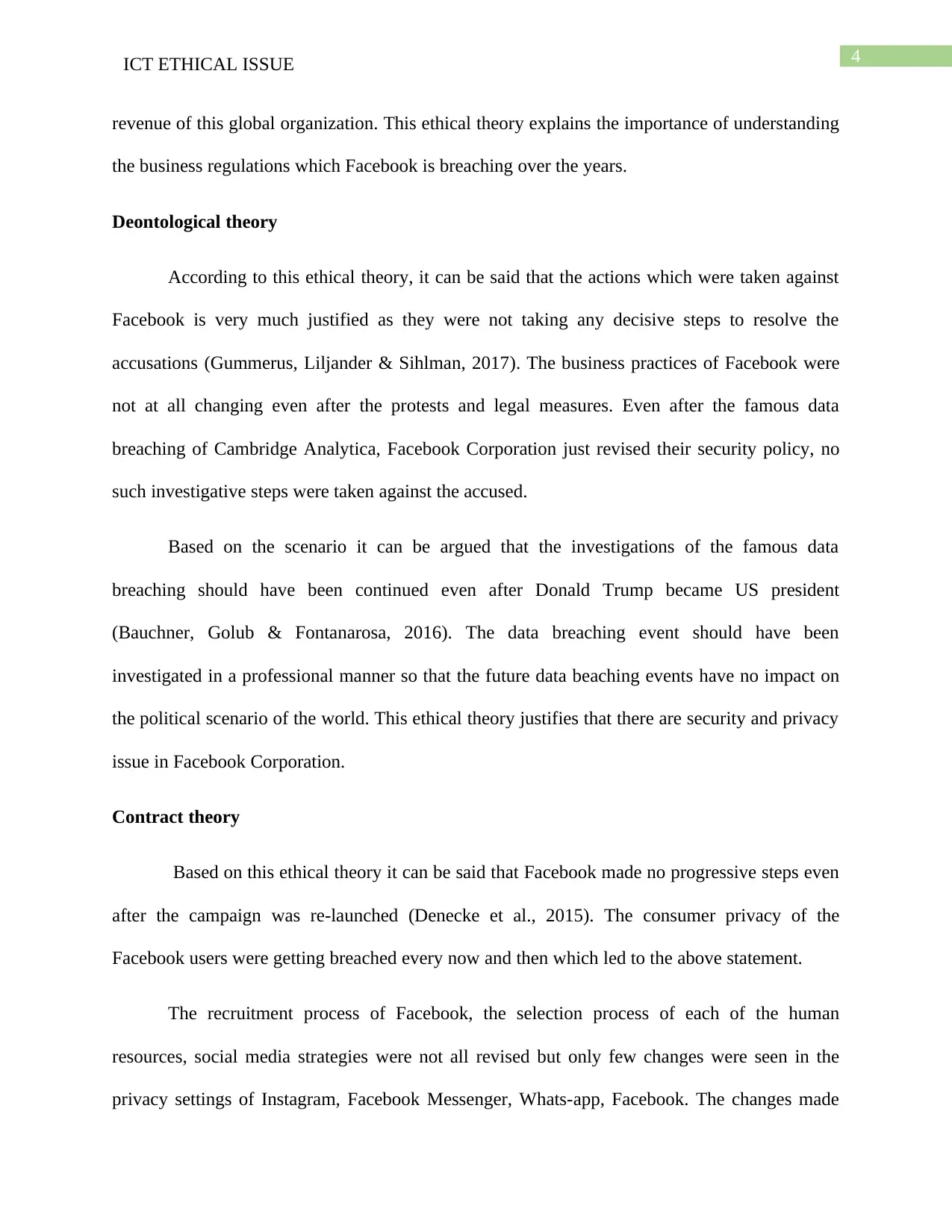
4ICT ETHICAL ISSUE
revenue of this global organization. This ethical theory explains the importance of understanding
the business regulations which Facebook is breaching over the years.
Deontological theory
According to this ethical theory, it can be said that the actions which were taken against
Facebook is very much justified as they were not taking any decisive steps to resolve the
accusations (Gummerus, Liljander & Sihlman, 2017). The business practices of Facebook were
not at all changing even after the protests and legal measures. Even after the famous data
breaching of Cambridge Analytica, Facebook Corporation just revised their security policy, no
such investigative steps were taken against the accused.
Based on the scenario it can be argued that the investigations of the famous data
breaching should have been continued even after Donald Trump became US president
(Bauchner, Golub & Fontanarosa, 2016). The data breaching event should have been
investigated in a professional manner so that the future data beaching events have no impact on
the political scenario of the world. This ethical theory justifies that there are security and privacy
issue in Facebook Corporation.
Contract theory
Based on this ethical theory it can be said that Facebook made no progressive steps even
after the campaign was re-launched (Denecke et al., 2015). The consumer privacy of the
Facebook users were getting breached every now and then which led to the above statement.
The recruitment process of Facebook, the selection process of each of the human
resources, social media strategies were not all revised but only few changes were seen in the
privacy settings of Instagram, Facebook Messenger, Whats-app, Facebook. The changes made
revenue of this global organization. This ethical theory explains the importance of understanding
the business regulations which Facebook is breaching over the years.
Deontological theory
According to this ethical theory, it can be said that the actions which were taken against
Facebook is very much justified as they were not taking any decisive steps to resolve the
accusations (Gummerus, Liljander & Sihlman, 2017). The business practices of Facebook were
not at all changing even after the protests and legal measures. Even after the famous data
breaching of Cambridge Analytica, Facebook Corporation just revised their security policy, no
such investigative steps were taken against the accused.
Based on the scenario it can be argued that the investigations of the famous data
breaching should have been continued even after Donald Trump became US president
(Bauchner, Golub & Fontanarosa, 2016). The data breaching event should have been
investigated in a professional manner so that the future data beaching events have no impact on
the political scenario of the world. This ethical theory justifies that there are security and privacy
issue in Facebook Corporation.
Contract theory
Based on this ethical theory it can be said that Facebook made no progressive steps even
after the campaign was re-launched (Denecke et al., 2015). The consumer privacy of the
Facebook users were getting breached every now and then which led to the above statement.
The recruitment process of Facebook, the selection process of each of the human
resources, social media strategies were not all revised but only few changes were seen in the
privacy settings of Instagram, Facebook Messenger, Whats-app, Facebook. The changes made
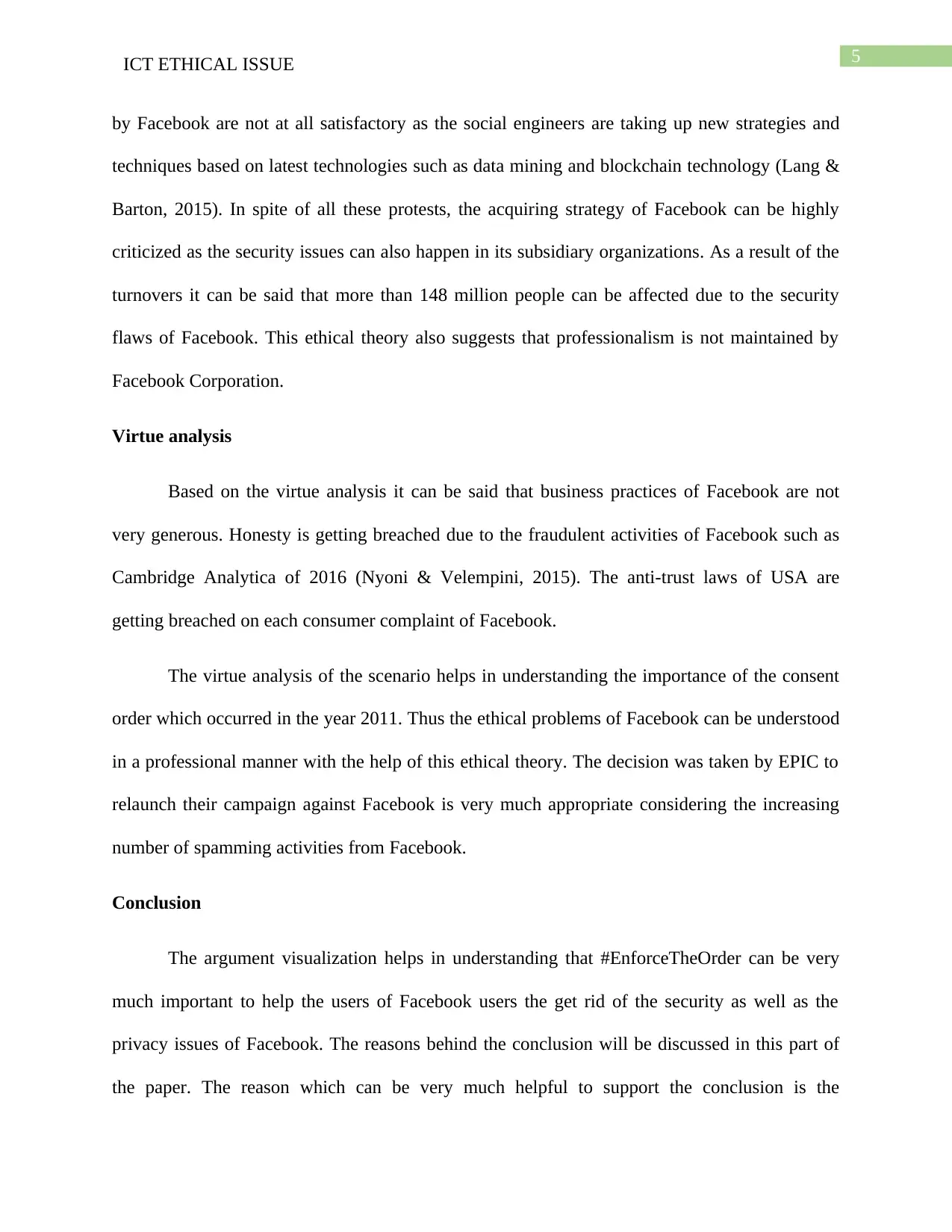
5ICT ETHICAL ISSUE
by Facebook are not at all satisfactory as the social engineers are taking up new strategies and
techniques based on latest technologies such as data mining and blockchain technology (Lang &
Barton, 2015). In spite of all these protests, the acquiring strategy of Facebook can be highly
criticized as the security issues can also happen in its subsidiary organizations. As a result of the
turnovers it can be said that more than 148 million people can be affected due to the security
flaws of Facebook. This ethical theory also suggests that professionalism is not maintained by
Facebook Corporation.
Virtue analysis
Based on the virtue analysis it can be said that business practices of Facebook are not
very generous. Honesty is getting breached due to the fraudulent activities of Facebook such as
Cambridge Analytica of 2016 (Nyoni & Velempini, 2015). The anti-trust laws of USA are
getting breached on each consumer complaint of Facebook.
The virtue analysis of the scenario helps in understanding the importance of the consent
order which occurred in the year 2011. Thus the ethical problems of Facebook can be understood
in a professional manner with the help of this ethical theory. The decision was taken by EPIC to
relaunch their campaign against Facebook is very much appropriate considering the increasing
number of spamming activities from Facebook.
Conclusion
The argument visualization helps in understanding that #EnforceTheOrder can be very
much important to help the users of Facebook users the get rid of the security as well as the
privacy issues of Facebook. The reasons behind the conclusion will be discussed in this part of
the paper. The reason which can be very much helpful to support the conclusion is the
by Facebook are not at all satisfactory as the social engineers are taking up new strategies and
techniques based on latest technologies such as data mining and blockchain technology (Lang &
Barton, 2015). In spite of all these protests, the acquiring strategy of Facebook can be highly
criticized as the security issues can also happen in its subsidiary organizations. As a result of the
turnovers it can be said that more than 148 million people can be affected due to the security
flaws of Facebook. This ethical theory also suggests that professionalism is not maintained by
Facebook Corporation.
Virtue analysis
Based on the virtue analysis it can be said that business practices of Facebook are not
very generous. Honesty is getting breached due to the fraudulent activities of Facebook such as
Cambridge Analytica of 2016 (Nyoni & Velempini, 2015). The anti-trust laws of USA are
getting breached on each consumer complaint of Facebook.
The virtue analysis of the scenario helps in understanding the importance of the consent
order which occurred in the year 2011. Thus the ethical problems of Facebook can be understood
in a professional manner with the help of this ethical theory. The decision was taken by EPIC to
relaunch their campaign against Facebook is very much appropriate considering the increasing
number of spamming activities from Facebook.
Conclusion
The argument visualization helps in understanding that #EnforceTheOrder can be very
much important to help the users of Facebook users the get rid of the security as well as the
privacy issues of Facebook. The reasons behind the conclusion will be discussed in this part of
the paper. The reason which can be very much helpful to support the conclusion is the
⊘ This is a preview!⊘
Do you want full access?
Subscribe today to unlock all pages.

Trusted by 1+ million students worldwide
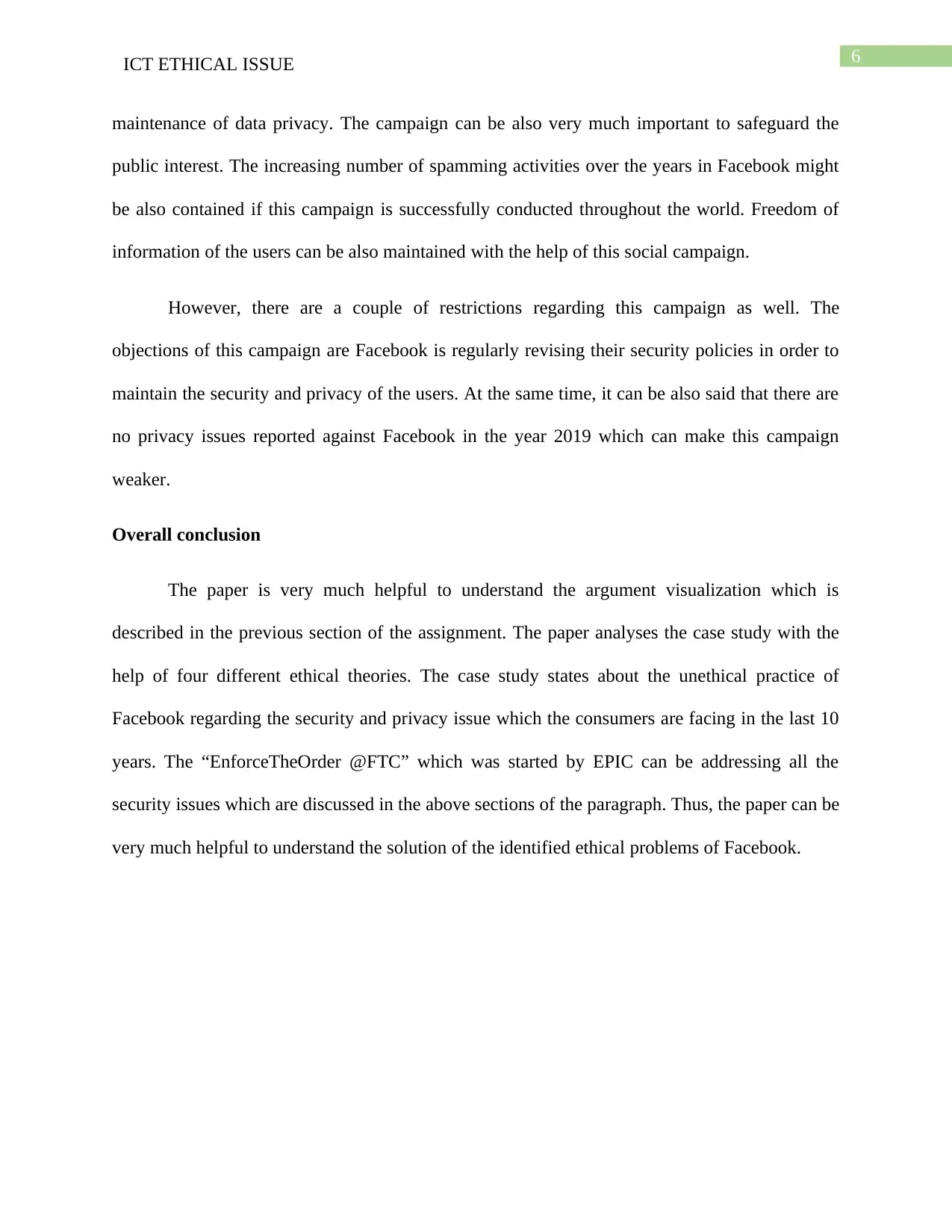
6ICT ETHICAL ISSUE
maintenance of data privacy. The campaign can be also very much important to safeguard the
public interest. The increasing number of spamming activities over the years in Facebook might
be also contained if this campaign is successfully conducted throughout the world. Freedom of
information of the users can be also maintained with the help of this social campaign.
However, there are a couple of restrictions regarding this campaign as well. The
objections of this campaign are Facebook is regularly revising their security policies in order to
maintain the security and privacy of the users. At the same time, it can be also said that there are
no privacy issues reported against Facebook in the year 2019 which can make this campaign
weaker.
Overall conclusion
The paper is very much helpful to understand the argument visualization which is
described in the previous section of the assignment. The paper analyses the case study with the
help of four different ethical theories. The case study states about the unethical practice of
Facebook regarding the security and privacy issue which the consumers are facing in the last 10
years. The “EnforceTheOrder @FTC” which was started by EPIC can be addressing all the
security issues which are discussed in the above sections of the paragraph. Thus, the paper can be
very much helpful to understand the solution of the identified ethical problems of Facebook.
maintenance of data privacy. The campaign can be also very much important to safeguard the
public interest. The increasing number of spamming activities over the years in Facebook might
be also contained if this campaign is successfully conducted throughout the world. Freedom of
information of the users can be also maintained with the help of this social campaign.
However, there are a couple of restrictions regarding this campaign as well. The
objections of this campaign are Facebook is regularly revising their security policies in order to
maintain the security and privacy of the users. At the same time, it can be also said that there are
no privacy issues reported against Facebook in the year 2019 which can make this campaign
weaker.
Overall conclusion
The paper is very much helpful to understand the argument visualization which is
described in the previous section of the assignment. The paper analyses the case study with the
help of four different ethical theories. The case study states about the unethical practice of
Facebook regarding the security and privacy issue which the consumers are facing in the last 10
years. The “EnforceTheOrder @FTC” which was started by EPIC can be addressing all the
security issues which are discussed in the above sections of the paragraph. Thus, the paper can be
very much helpful to understand the solution of the identified ethical problems of Facebook.
Paraphrase This Document
Need a fresh take? Get an instant paraphrase of this document with our AI Paraphraser

7ICT ETHICAL ISSUE
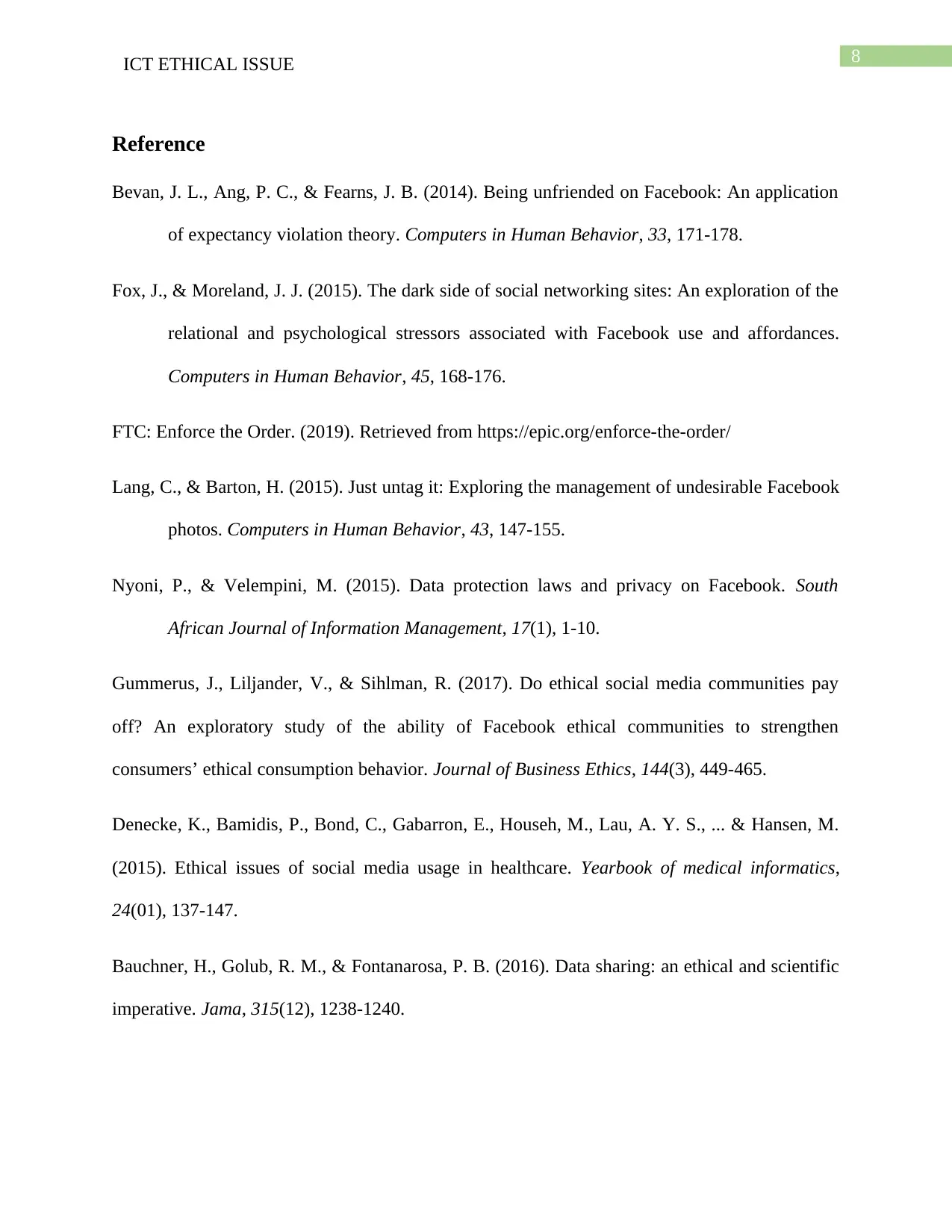
8ICT ETHICAL ISSUE
Reference
Bevan, J. L., Ang, P. C., & Fearns, J. B. (2014). Being unfriended on Facebook: An application
of expectancy violation theory. Computers in Human Behavior, 33, 171-178.
Fox, J., & Moreland, J. J. (2015). The dark side of social networking sites: An exploration of the
relational and psychological stressors associated with Facebook use and affordances.
Computers in Human Behavior, 45, 168-176.
FTC: Enforce the Order. (2019). Retrieved from https://epic.org/enforce-the-order/
Lang, C., & Barton, H. (2015). Just untag it: Exploring the management of undesirable Facebook
photos. Computers in Human Behavior, 43, 147-155.
Nyoni, P., & Velempini, M. (2015). Data protection laws and privacy on Facebook. South
African Journal of Information Management, 17(1), 1-10.
Gummerus, J., Liljander, V., & Sihlman, R. (2017). Do ethical social media communities pay
off? An exploratory study of the ability of Facebook ethical communities to strengthen
consumers’ ethical consumption behavior. Journal of Business Ethics, 144(3), 449-465.
Denecke, K., Bamidis, P., Bond, C., Gabarron, E., Househ, M., Lau, A. Y. S., ... & Hansen, M.
(2015). Ethical issues of social media usage in healthcare. Yearbook of medical informatics,
24(01), 137-147.
Bauchner, H., Golub, R. M., & Fontanarosa, P. B. (2016). Data sharing: an ethical and scientific
imperative. Jama, 315(12), 1238-1240.
Reference
Bevan, J. L., Ang, P. C., & Fearns, J. B. (2014). Being unfriended on Facebook: An application
of expectancy violation theory. Computers in Human Behavior, 33, 171-178.
Fox, J., & Moreland, J. J. (2015). The dark side of social networking sites: An exploration of the
relational and psychological stressors associated with Facebook use and affordances.
Computers in Human Behavior, 45, 168-176.
FTC: Enforce the Order. (2019). Retrieved from https://epic.org/enforce-the-order/
Lang, C., & Barton, H. (2015). Just untag it: Exploring the management of undesirable Facebook
photos. Computers in Human Behavior, 43, 147-155.
Nyoni, P., & Velempini, M. (2015). Data protection laws and privacy on Facebook. South
African Journal of Information Management, 17(1), 1-10.
Gummerus, J., Liljander, V., & Sihlman, R. (2017). Do ethical social media communities pay
off? An exploratory study of the ability of Facebook ethical communities to strengthen
consumers’ ethical consumption behavior. Journal of Business Ethics, 144(3), 449-465.
Denecke, K., Bamidis, P., Bond, C., Gabarron, E., Househ, M., Lau, A. Y. S., ... & Hansen, M.
(2015). Ethical issues of social media usage in healthcare. Yearbook of medical informatics,
24(01), 137-147.
Bauchner, H., Golub, R. M., & Fontanarosa, P. B. (2016). Data sharing: an ethical and scientific
imperative. Jama, 315(12), 1238-1240.
⊘ This is a preview!⊘
Do you want full access?
Subscribe today to unlock all pages.

Trusted by 1+ million students worldwide
1 out of 9
Related Documents
Your All-in-One AI-Powered Toolkit for Academic Success.
+13062052269
info@desklib.com
Available 24*7 on WhatsApp / Email
![[object Object]](/_next/static/media/star-bottom.7253800d.svg)
Unlock your academic potential
Copyright © 2020–2026 A2Z Services. All Rights Reserved. Developed and managed by ZUCOL.





